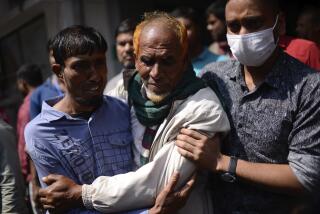In Bangladesh, search for bodies from factory collapse ends
NEW DELHI, India — The Bangladesh army announced Monday it would end its search for bodies in the rubble of a garment factory complex that collapsed nearly three weeks ago in a suburb of the capital, Dhaka.
Saying they believe they have found all the corpses, authorities placed the final death toll at or close to 1,127, making it the worst disaster in the history of the global apparel industry.
The eight-story Rana Plaza collapsed April 24th just before 9 a.m., leading to weeks of frantic rescue efforts as anguished relatives watched and waited under the hot sun.
The disaster has focused global attention on the desperate conditions for workers in Bangladesh making clothes for bargain-hungry Western consumers. On Monday, the Bangladesh government announced several proposed reforms, including the right to form labor unions.
Spirits were buoyed Friday when a 19-year old seamstress identified as Reshma was found alive after surviving 17 days under the rubble on crackers and small amounts of water she forced herself to drink slowly.
Reshma told reporters Monday from a hospital wheelchair that she’ll never work in a Bangladesh garment factory again. Part of her head covered by a light shawl where she suffered a head injury, Reshma said she had worked at Rana Plaza for only a few weeks and earned around $60 a month.
On the morning of the accident, Reshma said she heard from colleagues that cracks had appeared in the building, in which a ninth floor was reportedly under construction. She said she was reluctant to enter but was told by management that there was no problem. When the building collapsed soon after, she said she tried unsuccessfully to crawl to safety.
While Reshma’s ultimate survival brought joy to one family, it may have spurred false hope in many others.
On Monday, army officers said they didn’t believe there were any more people, alive or dead, in the wreckage, adding that they were poised to turn over recovery and cleanup operations to civilian authorities and return to their barracks Tuesday. Many of the bodies are so badly decomposed that relatives have been unable to identify their loved ones.
“We will return to our bases after we hand over the rescue operation to the local administration,” Col. Ibne Fazal Shayekhuzzaman said at a news conference.
The collapse was the worst industrial accident in the nation’s history and the latest in a series of fatal accidents to hit its garment industry. A fire in November killed at least 110 people and another blaze last week left eight dead.
Garment-making is a huge employer and money-maker for Bangladesh, making up 80% of the nation’s $24-billion annual exports. Global scrutiny in the wake of the disaster and fear that companies will take their business elsewhere has fueled the push for reform.
But international labor activists say South Asian nations have a long history of enacting effective-sounding legislation that is subsequently watered down by corruption and weak implementation.
The Bangladesh Cabinet on Monday approved a labor law amendment allowing garment workers to form labor unions without preapproval from management. It is expected to be passed by parliament.
The government also has temporarily closed several factories until they meet safety standards and said it will form a wage board to consider pay increases for garment workers. Another proposal would make group insurance mandatory for companies employing at least 100 workers.
Since the accident, Dhaka has seen episodes of violence, protests and general strikes. In response, factory owners said Monday they’ve decided to close over 300 factories in the Ashulia industrial belt on the outskirts of the capital Dhaka until further notice.
The government and activists have accused the owner of building the massive Rana Plaza structure without proper permits, using shoddy building materials and building extra floors, which were then filled with heavy equipment.
ALSO:
Greek government orders teachers not to strike
Britain’s Cameron, meeting with Obama, under fire at home on EU
The Week Ahead: Imelda’s back, Iran at impasse, Syria in turmoil
Tanvi Sharma in the New Delhi bureau contributed to this report.
More to Read
Sign up for Essential California
The most important California stories and recommendations in your inbox every morning.
You may occasionally receive promotional content from the Los Angeles Times.










